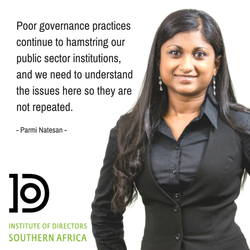 Current news reports relating to the South African Nuclear Energy Corporation (Necsa) indicate once again the damage that poor governance can cause to institutions that are funded by public money and whose influence on society is huge. Insofar as they can be ascertained, the facts seem to be that the board of Necsa suspended the CEO for disciplinary lapses, apparently with the approval of the Minister of Energy, Tina Joemat-Pettersson. Subsequently, the Minister changed track, instructing the board to reverse the suspension, which it refused to do. The Minister then announced a task team to investigate the board. Allegations of political maneuvering ahead of the proposed deal to build nuclear reactors continue to fly. “The ins and outs of this situation are not really the main issue here. The real casualty here is Necsa itself, and by implication the whole process around the forthcoming nuclear build programme,” says Parmi Natesan, Executive: Centre for Corporate Governance at the Institute of Directors in Southern Africa (IoDSA). “Poor governance practices continue to hamstring our public sector institutions, and we need to understand the issues here so they are not repeated.” Suspension of CEO requires balancing act Natesan says that one important issue is the suspension of the CEO. Such an action causes severe damage to the reputation of the individual concerned, obviously, but also to the institution itself. Accordingly, suspension should be seen as a last resort, and only if the board is certain it has all the facts, and that the executive’s continued presence would harm the organisation or interfere with further investigation of the allegations. Suspension can be seen as showing a board’s commitment to accountability, but it also opens it to accusations of bias and the suspicion of prejudgment. Consider the case of the Pikitup CEO, who was suspended for a long period but who has recently been cleared and reinstated. The lengthy and public suspension has caused severe damage to the reputations of both the individual and the company—something that could have been avoided or minimised. However, it’s also worth mentioning that the board has to have confidence in the executive management of the company, and thus must have full control over who holds the executive positions. An additional complication at Necsa is the fact that the executive committee appears to have come out in support of the CEO and thus in opposition to the board. The spectacle of a board at loggerheads with the executives who are supposed to report to it is extremely damaging to the company, and is typically a result of loyalties being divided. The litmus test, she concludes, must always be the company’s best interest and its long-term, strategic goals. Lack of role clarity A second important issue is the lack of role clarity in the public sector, here shown by the way in which the Minister “instructed” the board to perform certain actions. Shareholders appoint Boards to direct and oversee the company, and thus these Boards must be free to exercise their collective judgement and make their own decisions. A powerful, single shareholder can break down this necessary distance, so that the board merely becomes a rubber stamp for the shareholder, or the two are in constant conflict. Another example of this lack of role clarity between the shareholder and the board in the public sector is the Minister of Communications’ attempts to make the SABC board seek her approval on any rule changes to the SABC’s governance, and her determination to appoint Hlaudi Motsoeneng as COO despite the board’s reservations. “Again, the company’s well-being must be paramount. Boards have to be given the space to take a more deliberate, long-term and objective view of the company’s best interests,” she argues. Improper use of funds A third issue concerns allegations that the CEO improperly diverted company funds to the ANC, with allegations of nepotism continuing to break in the media. The question here is whether the CEO acted within the bounds of the powers delegated to him by the board. Delegation of authority is a vital tool used by boards to retain adequate control while enabling the company to operate effectively and efficiently. These allegations also highlight the need for a strong audit committee to oversee the proper use of public money. Each year, the Auditor-General’s reports show increasing levels of fruitless and wasteful expenditure in the public sector; audit committees have a vital role to play in ensuring that processes are put in place to prevent and detect this waste of public money. “In the end, the CEO role is critical for a company’s success,” says Natesan. “The board must act in the company’s best interest, and must be allowed to do so. The minister, representing the shareholder, should also have the company’s well-being at heart, and should desist from undue interference.” ENDS MEDIA CONTACT: Cathlen Fourie, 082 222 9198, [email protected] For more information on the IoDSA please visit: Website: www.iodsa.co.za Twitter: @The_IoDSA LinkedIn: The Institute of Directors in Southern Africa group  Parmi Natesan Parmi Natesan The Institute of Directors in Southern Africa (IoDSA) is adding a governance view to the concern being expressed in recent new articles around proposed changes to the SABC’s Memorandum of Incorporation (MoI) by Minister Faith Muthambi. Parmi Natesan, Executive: Centre for Corporate Governance at the IoDSA, says that some of the reported changes do not align to governance best practice. One issue raised by Natesan is the fact that the changes to the MoI has the potential to blur the governance roles played by the shareholder (the state) and the SABC board. In the private sector it is very clear that the shareholders hold shares in a company and appoint a board to direct and oversee the company on their behalf. “The board could bear liability if its decisions are wrong, so it’s important that it has the power to make its own decisions,” Natesan explains. “Thus if shareholders interfere too much in the way that the company is run, then governance breaks down. This is unfortunately a common problem that exists in the public sector as boards become rubber stamps for the dominant shareholder—which results in poor board and ultimately poor company performance.” Another adverse result is that these boards find it increasingly difficult to attract directors with the right levels of knowledge and skills. Individuals with governance knowledge would be reluctant to serve on such boards because they realise they will incur great responsibility and liability, whilst their true power to make the right decisions are restricted. The MoI also permits the Minister to appoint the COO as acting CEO when the latter position is vacant, and also gives her the power to extend employment contracts for the CEO, CFO and COO. Natesan points out that there is a danger of sacrificing general principles in order to achieve short-term goals. There’s widespread agreement that boards have to be responsible for executive appointments because executives are responsible and accountable to the board. When executives are appointed by the shareholder, they tend to feel accountable to the Minister, as the representative of the shareholder, and not the board. Again, as the IoDSA’s studies show, this causes significant confusion around role clarity and reporting lines within the governance structure. A more complex, though related, issue is the power given to the Minister to recommend the removal of a board member. Shareholders have always had the power to remove directors but Natesan cautions that the dynamics are complicated when there is a single shareholder represented by a single individual. In the private sector, the fact that there are generally multiple shareholders ensures that alternative viewpoints compete, and the delicate balance between shareholders and board can be maintained. “The fact that public sector corporations have only one shareholder who is politically driven, makes it much harder to strike the right governance balance, and this in turn compromises the board’s ability to do its job,” says Natesan. “If the single shareholder refuses to follow governance best practices in pursuit of short-term, political ends, it will fatally damage the ability of an entity to function effectively. South Africa is a global leader in corporate governance—we should practice what we preach.” ENDS MEDIA CONTACT: Cathlen Fourie, 012 664 2833, [email protected] For more information on the IoDSA please visit: Website: www.iodsa.co.za Twitter: @The_IoDSA LinkedIn: The Institute of Directors in Southern Africa group Recent CIPC warnings to state-owned companies raises the spotlight on public sector governance25/9/2014 The recent warnings issued by the Company and Intellectual Property Commission to five state-owned companies demonstrate once again just how seriously boards need to take their governance role, says Parmi Natesan, Executive: Centre for Corporate Governance at the Institute for Directors in Southern Africa (IoDSA).
As reported in Business Day Live, the CIPC warned the boards of the South African Express Airways, South African Forestry Company, South African Broadcasting Corporation, South African Post Office and the Central Energy Fund that they risked being declared delinquent or of being placed on probation if they failed to address their non-compliance with the Companies Act. A finding of delinquency will adversely affect the long-term reputation of these directors, effectively calling their fitness for office into question. It could also results in these directors being disqualified in terms of the Companies Act, from taking up Directorship positions in the future. “The CIPC has indicated that it intends to be proactive in holding these companies and their boards to account,” observes Natesan. Governance best practice, as denoted in King III Principle 6.1, is for the board to take ultimate accountability for ensuring compliance with laws and regulations. “Compliance with the law is not optional, and directors need to make sure that the companies that they are overseeing are doing so.” Natesan points out that the IoDSA’s 2014 benchmark study of board performance shows that public-sector boards, by their own admission, are lagging those in the private sector in most areas. Aside from the board, Natesan says that in the public sector, the audit committee should play a big role in ensuring that the company, inter alia, complies with the applicable legislation. However, audit committees in the public sector generally need to be strengthened, as is indicated by the high percentage of public-sector entities whose financial statements are disclaimed annually by the Auditor-General—for example, only 48 percent of audited organisations obtained an unqualified audit opinion in 2011-12, while 94 percent were found to be materially non-compliant with legislation. The CIPC said it is particularly concerned about irregular expenditure, which points directly to a lack of quality audit committee oversight. “The long and short of it is that audit committees have a vital role to play in assisting their boards with discharging their duties as regards to compliance. In the public sector, particularly, audit committees sometimes face several challenges which make it difficult for them to adequately fulfil their responsibilities,” says Natesan. “As this latest development shows, boards in both the public and private sectors will bear the consequences of their audit committee’s lack of performance, and should thus be looking for ways to improve it—such as participating in the Public Sector Audit Committee Forum, a forum created to strengthen Audit Committees in the public sector.” ENDS MEDIA CONTACT: Cathlen Fourie, 012 664 2833, [email protected] For more information on the IoDSA please visit: Website: www.iodsa.co.za Twitter: @The_IoDSA LinkedIn: The Institute of Directors in Southern Africa group |
Archives
July 2024
Categories
All
|

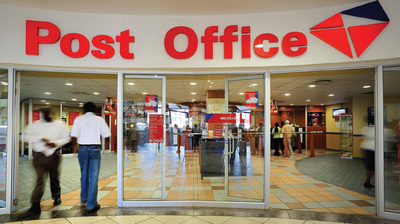
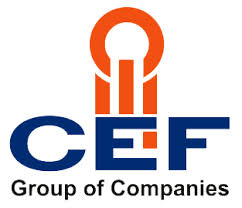

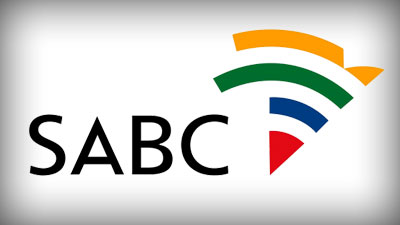
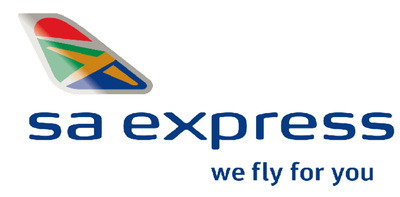
 RSS Feed
RSS Feed